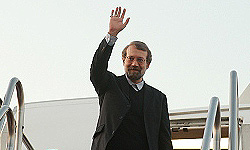October 22, 2007
?Was Ali Larijani Forced to Resign

By Ali Nourizadeh
London, Asharq Al-Awsat - Dismissal or resignation? That is the question buzzing around Iran today after former Secretary of Iran’s Supreme National Security Council and chief nuclear negotiator, Ali Larijani, tendered his resignation last Saturday 20 October. The silence surrounding this recent development has been a resounding one with no reasons or motives cited for resignation, or indeed, dismissal.

According to one of Larijani’s relatives who agreed to speak to Asharq Al-Awsat on condition of anonymity, last Thursday evening, Larijani strongly objected against President Ahmadinejad’s statements following Russian President Vladimir Putin’s visit to Tehran. Ahmadinejad has denied that President Putin had offered proposals intended to resolve the nuclear standoff with some Western countries, with the knowledge that Larijani had previously confirmed it after Putin’s meeting with Iranian Supreme Guide Ayatollah Ali Khamenei.
The same source has confirmed that Larijani heard the news of his resignation on the radio and television before he had submitted his letter of resignation to Ahmadinejad, which indicates that Ayatollah Khamenei had disclosed to Ahmadinejad Larijani’s intention to resign his post in protest against the president’s actions and interventions in the sensitive nuclear issue.
Ahmadinejad had previously dismissed oil and industry ministers [Kazem Vaziri-Hamaneh and Alireza Tahmasbi respectively] last August and replaced them with interim ministers [Gholam Hossein Nozari and Ali Akbar Mehrabian respectively].
A statement issued by government spokesman and Minister of Justice, Gholam Hossein Elham, declared that Vaziri-Hamaneh and Tahmasbi had submitted their resignations, however both ministers have denied this claim and upheld that they had been dismissed.
Although Iran’s Foreign Ministry spokesman Mohammad Ali Hosseini announced yesterday (Sunday 21) that Larijani will accompany Saeed Jalili to Rome this coming Tuesday 23 for a meeting with the European Union’s foreign policy head Javier Solana, sources close to Larijani uphold that he has yet to make a decision on the matter. Jalili is Deputy Foreign Minister of Iran and Larijani’s successor as chief nuclear negotiator.
As for Larijani’s new duties; a source close to him said that Larijani has been advisor to the Supreme Guide for over 17 years, even during his post as Culture and Islamic Guidance Minister and as the head of radio and television.
The source has also confirmed that Larijani will maintain his position and clout in Tehran's decision-making circles and that he will retain his post as the Supreme Guide principal advisor.
Larijani’s replacement, Jalili, a PhD graduate in political science and author of the book ‘The Prophet Mohammed’s Foreign Policy’, has been described by Western diplomats as a “hardliner” who takes pride in “giving endless lessons to his interlocutors.”
Mark Fitzpatrick, Senior fellow for Non-proliferation at the International Institute for Strategic Studies (IISS) agrees that the choice is an extremist one and that, “it will make it more difficult to reach an agreement, since there are no pragmatic nuclear negotiators in Iran to negotiate with,” he said.
The moderate reformist ‘Etemad-e Melli’ newspaper has stated that Ahmadinejad’s act of appointing one of his aides to supervise over the nuclear negotiations indicates the possibility of the failure of these negotiations.
“The fact that the team of nuclear negotiators and the Iranian diplomats have become united under the supervision of close presidential aides marks a strategic step, which the president and his advisors fully apprehend the cost of,” said the newspaper.
Meanwhile, in his address to the Washington Institute for Near East Policy, American Vice President Dick Cheney warned that, “The United States joins other nations in sending a clear message: We will not allow Iran to have a nuclear weapon.”
He also added that, “The Iranian regime needs to know that if it stays on its present course, the international community is prepared to impose serious consequences,” and that Iran was standing in the way of peace in the Middle East with its disruption and deception concerning the nuclear issue.

